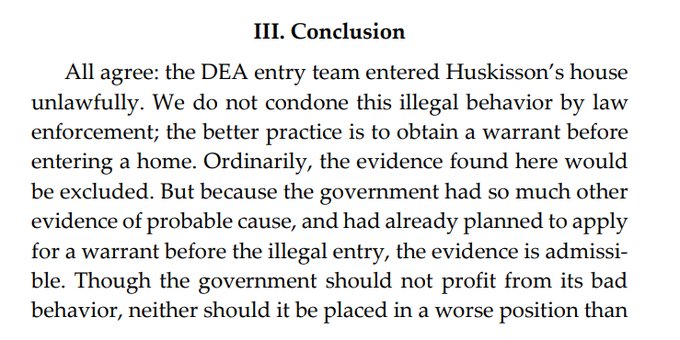Police Raid A Home Hours Before Obtaining A Search Warrant. Three Judges Just Ruled The Evidence Is Admissible.
A person who obtained a large quantity of drugs was arrested, but the way the evidence against him was obtained should worry others about their constitutional rights.
In a legal decision by the U.S. Court of Appeals for the Seventh Circuit, three judges determined that even though police illegally entered Paul Huskisson’s home without a warrant, the evidence they obtained during that illegal entrance could be used against him in court.
The story starts on February 5, 2016, when Anthony Hardy was arrested by Drug Enforcement Administration agents. He cut a deal by admitting to his drug offenses, giving up his drugs and guns, and providing the names of two local drug dealers to the authorities. One of those drug dealers was Huskisson, who at that time was unknown to Indianapolis DEA agents.
Hardy told agents he had been purchasing methamphetamine from Huskisson for months and that Huskisson was expecting a large shipment the day after Hardy was arrested. DEA agents listened to phone calls between Hardy and Huskisson about the shipment and recorded those phone calls.
On the day of the shipment, DEA agents were on standby as Hardy, Huskisson, and two other men handed off the drugs. When Hardy came outside and gave the signal, agents rushed into Huskisson’s home to secure the scene. The problem, however, was that they hadn’t received a search warrant to do so.
“Later that night, DEA agents filed the warrant application for Huskisson’s house. The application detailed Hardy’s history of drug deals with Huskisson, as well as the many phone calls between Hardy and Huskisson in the last twenty-four hours,” the judges wrote.
The application also included Hardy’s description of what happened inside the house and evidence obtained from inside the house before the warrant application.
“The law enforcement officers observed an open cooler with ten saran wrapped packages that contained suspected methamphetamine. The suspected methamphetamine later field tested positive for the presence of methamphetamine,” the warrant application said, according to court documents.
Huskisson was found guilty. His lawyers argued before and after the trial that the evidence obtained through the police’s illegal entry into his home should not have been included against him.
The three-judge appellate court, which consists of two judges appointed by President Donald Trump and one by former President Bill Clinton, concluded that the government had enough probable cause to obtain a search warrant even without the illegal evidence:
All agree: the DEA entry team entered Huskisson’s house unlawfully. We do not condone this illegal behavior by law enforcement; the better practice is to obtain a warrant before entering a home. Ordinarily, the evidence found here would be excluded. But because the government had so much other evidence of probable cause, and had already planned to apply for a warrant before the illegal entry, the evidence is admissible. Though the government should not profit from its bad behavior, neither should it be placed in a worse position than it would otherwise have occupied.
Attorney Marcus L. Schantz, replying to a tweet from USA Today editor Brad Heath, explained the problems with this decision:
SCOTUS needs to weigh in on this. The logical extension of that holding is that police can enter a home willy nilly and get the warrant later. No. No. No. No. A judge or magistrate decides if the police can enter, and there’s no guarantee the warrant will be approved.
One might respond that police likely had enough evidence to obtain a search warrant before entering the home, but that should just reinforce the position that they should have obtained that warrant first.
In this case, the person was guilty, but what happens when police are granted the ability to act first and apply for a warrant later? The ends do not justify the means.
Police Raid A Home Hours Before Obtaining A Search Warrant. Three Judges Just Ruled The Evidence Is Admissible.
 Reviewed by Your Destination
on
June 08, 2019
Rating:
Reviewed by Your Destination
on
June 08, 2019
Rating:
 Reviewed by Your Destination
on
June 08, 2019
Rating:
Reviewed by Your Destination
on
June 08, 2019
Rating:





No comments